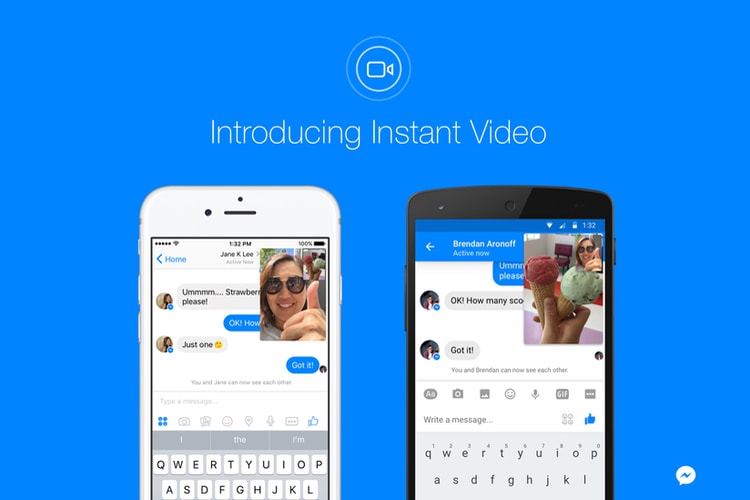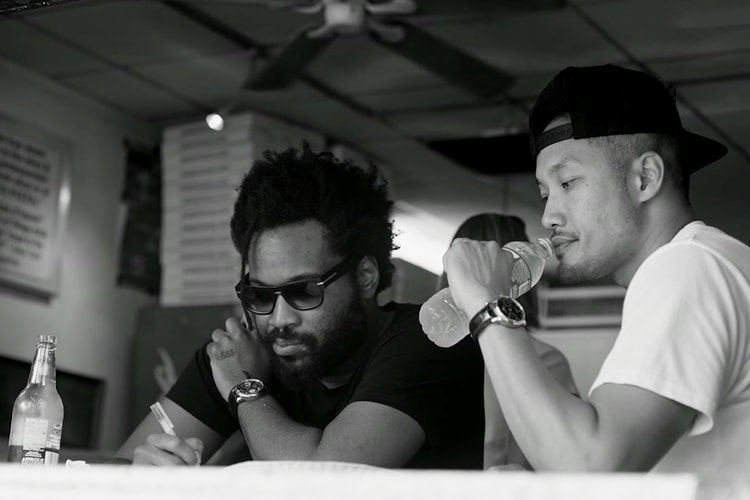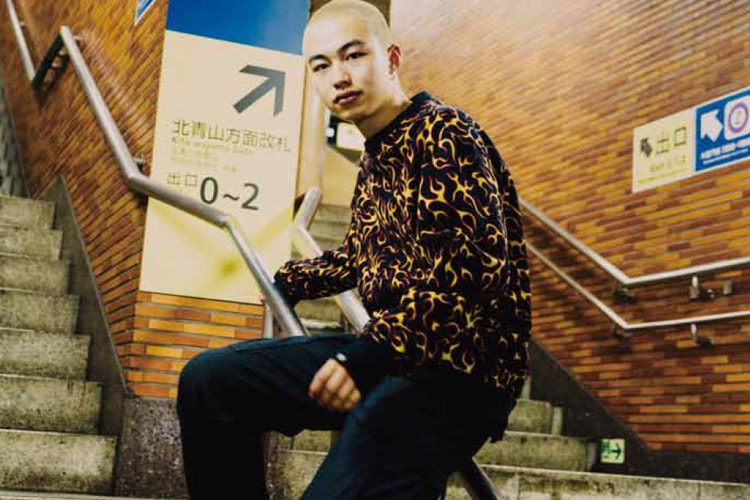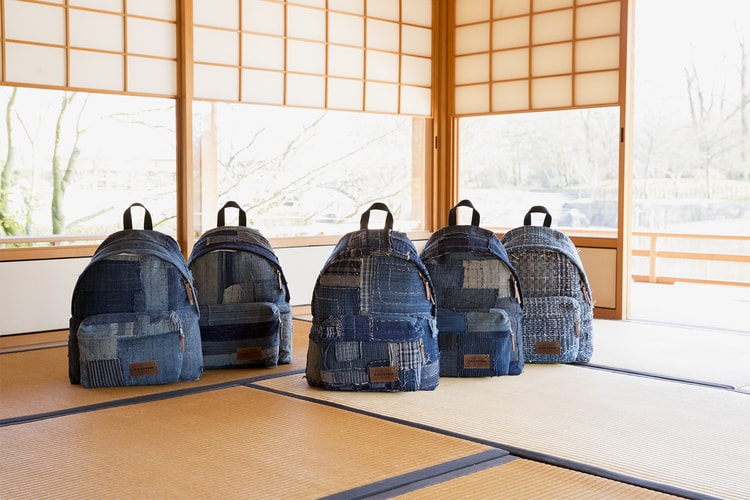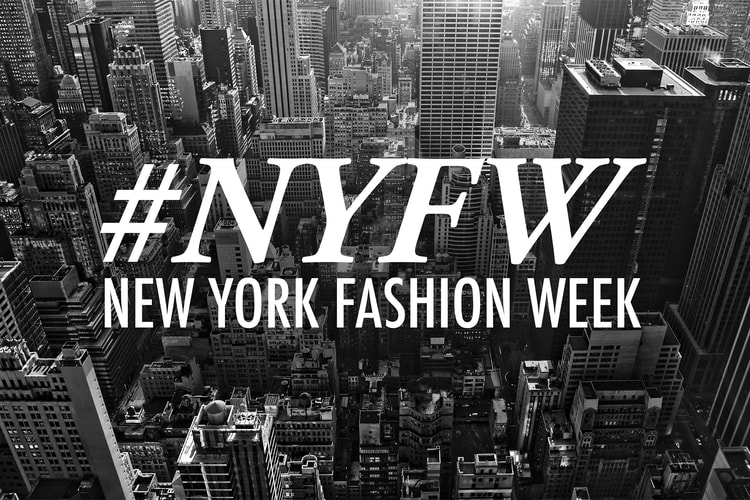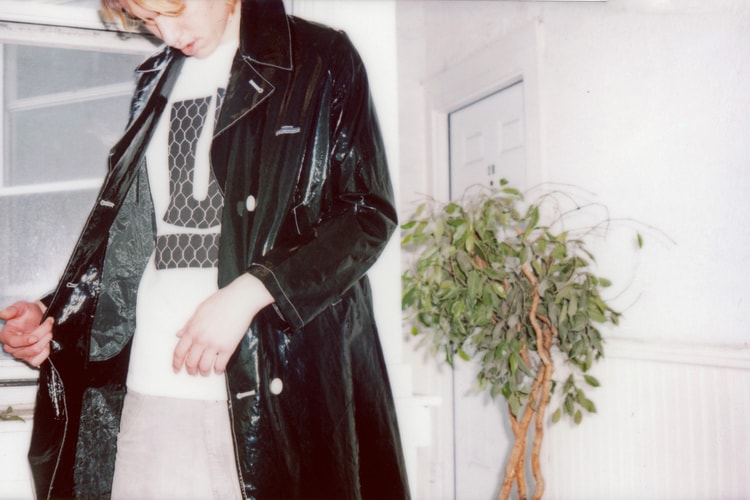“Our Music’s Got Teeth:” A Conversation with the Swet Shop Boys
The duo opens up about race, politics and Drake’s relatability.
It’s a concrete-gray day in London when HYPETRAK gets ahold of the Swet Shop Boys on Skype. Or at least that’s how the group’s producer Tom “Redinho” Calvert, chose to describe it. And it’s fitting, considering that the group’s first LP, Cashmere, was recorded in two short creative bursts, both in London: the first saw Heems recording five tracks over the course of a five-day stay in Redinho’s flat in May of 2015. This was a year after the group’s debut EP. Redinho was inspired by an a cappella for a track that would eventually become “Tiger Hologram.” The second session was another five-day marathon in May of this year, this time at Riz’s flat.
The latter creative session came at a watershed moment for minorities on both sides of the Atlantic: while Donald Trump’s surreal presidential campaign reached boiling pitch, Great Britain had nearly-simultaneously voted to leave the European Union. Both Brexit and Trumpmania dovetailed to form a political backdrop that put immigrants on the outs in their home countries.
All of this comes at a time when representation of minorities—and South Asians in particular—is at an all-time high in media: Aziz Ansari has Netflix’s Master of None; Kumail Nanjiani has a starring role in HBO’s Silicon Valley; Mindy Kaling has her eponymous sitcom; Sadiq Khan is London’s first Muslim mayor. Riz himself has found himself at the epicenter of this movement, earning near-universal critical acclaim for his starring role in HBO’s The Night Of; his supporting role alongside Jake Gyllenhaal in Nightcrawler; this is to say nothing of his forthcoming role in Rogue One: A Star Wars Story. Heems is no stranger to the acting scene, either: he landed a supporting role in 2015’s Creative Control and pitched a now-defunct pilot project to FOX.
This irony isn’t lost on the Swet Shop Boys whatsoever: when confronted with the imbalance between representation and Otherization, Heems notes that, “No matter how far you get, it’s still clawing at your back.”
Cashmere is a project that parries these claws with teeth: while “Tiger Hologram” bounces with a goofy party jam vibe, “T5” is a political statement on racial profiling in airports around the world. The album, which you can pre-order here, contains a track that deals with popular representation, called “Zayn Malik.”
As far as the production is concerned, Cashmere is a product of cultural synthesis. Redinho cites YouTube clips of Qawwali [a form of Sufi devotional music popular throughout the Indian subcontinent] performers like Aziz Mian (the “Brown James Brown,” as Riz describes him) as a primary influence and inspiration.
This influence can be heard on “Tiger Hologram,” which sees Redinho playing a harmonium synthesizer of his own creation over booming drums and hand-claps, while Heems and Riz go back-and-forth about a girl in the club, that most classic hip-hop trope. Their chemistry is, Heems notes, rooted in the tradition of jugalbundi, wherein dueling poets would compete in verse, each bringing a posse of supporters. Riz notes the tradition’s similarities to his own battle rapping days, while Heems can’t help but note that the Qawwals had their propensity toward substance abuse, and many traveled with their own version of a weed-man whose only job was to feed betel-leaves into the mouths of their poet of choice.
HYPETRAK sat down for an extensive conversation with the Swet Shop Boys that touched upon matters of race, politics and Drake’s relatability. Read on below for more and be ready for Cashmere, dropping October 14 via the group’s own imprint, Customs.

So you guys are all in different spots right now and I know that coordinating this must’ve been half the battle, so what’s the story of how this LP came together versus the EP?
Heems: Uh, Red?
Red: I was about to say, who wants to take that one? Well… these guys got the group together. It was an idea of Riz’s—he basically just started with a name. I think he told that to Heems and Heems was like, “yeah, I like that.” And they put a little EP out and then it seemed to me that it got a great reaction. But then these guys got busy with other things, so I asked what they were doing with this project. And they had an a cappella left over from that batch called “Tiger Hologram” and I made the beat for that and got really excited about it. They seemed to be into it. So I made a bunch of beats and just pushed the project, really, to get them on some of my beats and then that happened and that gave it some momentum. We hooked up a year after that in Riz’s flat and made the album in five days. So that’s the headline version of it all, from my perspective anyway.
Heems: Yeah, last year in May I was in London for a month and I think Riz might’ve been traveling or shooting, but I went over to Red’s house and banged out like 5 tracks in a day. So we were sitting on an EP of Riz, Red and mine and then we were thinking of what to do with that. In the meantime, Red had kinda sorted out a situation for the record and so I had just come back from living in India for a while and Riz had time in his schedule and so Red was like, “Let’s do this—get everyone to London” and just spent a week at Riz’s flat. We had those five songs, we probably cut ten more—at a rate of like two a day or something like that.
Riz: We had four tracks from May 2015 and then made another 11 or 12 that we made in May 2016, basically. And a lot of those tracks from May 2015 actually didn’t make it onto the album, for now. Apart from “Tiger Hologram.” So yeah, pretty much the whole album that we’re releasing in October was all recorded in five days this May that just went.
Speaking of “Tiger Hologram,” that’s the second single after “T5” and they seem polar opposites: one is super political, while the other is the party jam, right? So what’s the balance between the two on this album? Do you blend the two together at all? Do you see a difference between the two or do you try to balance humor with the political?
Riz: Well, usually what’ll happen is Himanshu will be like, “Look, man, we’ve gotta be really serious and political, aight?!” And I’ll be like, “Naaaah, man, fuck that, let’s just freestyle!” And I’ll start spitting comedy jams and the album coalesces.
Heems: That’s exactly how it goes down. I mean, Riz’s first song [“Post-9/11 Blues”] when I first reached out to him like, “Yo, I see you, dude,” was a humorous, Langston Hughes laugh-to-keep-from-crying tradition of dealing with something pretty depressing but trying to find a way to package it that isn’t just “Aaah, I’m gonna get really sad while listening to this song!” You wanna make happy music in spite of things falling apart around you and then another thing I would say is that Red’s production at times, coming from the UK, it is a bit dance-y, so you don’t wanna get on a dance-track or seven and just be like, “RACISM, RACISM, RACISM, DANCE!”
Riz: Although that is one of the tracks that didn’t make the album. So yeah, both Himanshu and I have been playing with that tone and walking that tightrope of “I’ve got something to say,” but also deliver it in a way that brings people in and uses comedy, wordplay, and wit and whatever. But yeah, it’s just natural. We don’t sit down and go, “Right, we’ve gotta do five serious tracks and five political tracks.” We’re all interested in certain things and we’re both socially and politically engaged as people. We also like cracking jokes and hanging out. So I think the album is a nice blend of those things. Working with Himanshu made my lyricism a lot more playful than it has been, say on my last solo project, the Englistan tape. And Himanshu was saying that this project has given him a chance to get more stuck into his politics, so we end up meeting in the middle but we’ve both been walking that line for a long time.
And Red, what has that done for your production?
Red: This project really opened me up and reinvigorated me, to be honest. I think the “Tiger Hologram” thing was my entry to the project as a contributor and Riz was linking me to some Qawwali stuff, particularly by this guy called Aziz Mian and that guy really captured my imagination for a lot of reasons, so I was influenced by that. I took some of the sounds and ideas and energies of watching him perform on YouTube and just started making beats because that really excited me.
And yeah, after we started recording together—because I had already worked with Riz, that’s the thing. We met on MySpace a long time ago and collaborated together. But my first experience with Heems was when he came to my house and we did the rap boot camp thing and made five tunes in a day. After you start working with people, you get that energy in your mind as well. You start getting excited about making beats, having particular characters in mind and what I was going to say about the decision-making, I don’t really get involved with the lyrical content but I’ll come in with some music I’ve made and say that this is the kind of tone or the atmosphere or the mood that I’m feeling on this track, so maybe something in this vein would be cool. That’s about it, as far as my influence on the lyrics goes, but usually very quickly they both have a ton of ideas and we hit record. It’s a fun process, I’ve really enjoyed it.
What’re some of the inspirations that you drew upon for samples and lyrics and experiences? What can people look forward to hearing?
Heems: I would say it’s a lot less straightforward sampling. What was exciting about working with Red was his musicality that he brought to the project. He didn’t just take a Bollywood song and throw an 808 under it, but it’s mostly just a Bollywood song with an 808 under it. So I don’t think there’s ever really been production like this and I’ve been looking for beats like these for ages. I don’t think I’ve ever really come across not just riding on a sample, but to have an actual musician of Red’s caliber digest Indian music and throw out what he knows from an osmosis of hip-hop, of grime, of garage and throw it all together. It’s more than just throwing a sample on Logic and add a drum beat to it. That’s what was super exciting for me.
Riz: It’s literally quite a dream scenario, in a way. It’s a tall order. It’s not a simple thing to do, like that’s a harmonium synth that Red created and is playing on “Tiger Hologram,” then you’ve got the hand-claps under there and that Qawwali feel to it and he’s really made it his own. So yeah, it’s a tricky thing to pull off, but I think he’s made it very coherent, y’know.
Red: Thanks, guys, yeah. It does come back to the initial starting point, which was the Qawwali stuff. Watching Aziz Mian play, cross-legged, in what looks to me like a cape, and he’s playing a harmonium and he’s got his boys around him. He starts telling a story, which I wouldn’t understand and then he’d be doubling the melodies, singing on the harmonium and then they break into a groove with the hand-claps, maybe a dholak or a tabla. And then they’d stop and he’d continue telling the story. Just that energy and that structure was really new to me, actually, but it also had a lot of familiarity. I kinda saw some James Brown in there.
Riz: He is the Brown James Brown, yeah! He’s got a big James Brown thing to him. Even as emcees, drawing on that punchline culture. Growing up, my creative role models were African-American rappers and as I became a teenager we started having our own explosions of jungle and grime and all that, but what was interesting in this project was realizing that there’s this other lineage of emcee culture, almost. It comes from our rich tradition of poetry. When Heems was showing me Shiv Kumar Batalvi and his Punjabi poetry, or I was bringing that Qawwali to the table, Aziz Mian, Faiz Ahmed Faiz, there’s a rich tradition of South Asian poets sitting around in a cypher and really dropping punchlines and just destroying crowds. You’ve gotta see some of these videos to really see it, but it reminded me of my rap battle days in a way where you wait to drop that right punchline to destroy that crowd. It’s drawing on a lot of our influences but putting it together in a really coherent, seamless way, like Himanshu was saying, rather than it being a cut-and-paste kinda thing.
Heems: There’s also this tradition in Indian and Pakistani poetry called jugalbundi, which is basically a rap battle, exactly. It’s two poets going back and forth, competing, pulling out punchlines and poetry that they had, making up things on the spot and you’ve literally got your posse behind you going “Ooohhh!” Even the tradition of the weed-carrier, they have assistant dudes behind them putting betel leaf with tobacco into their mouth while they’re singing, it’s literally what a weed-carrier is! They’ve got four weed-men behind them putting tobacco in their mouth and they’re extremely wavy fellas. Like a Punjabi Jim Jones.
Riz: They all die of liver failure in the end, man. All these Qawwali singers, man…
Heems: Those guys like their whisky, definitely. They’re definitely gone off the Henny.
Riz: Just to follow through on that thought, thinking of how Qawwali singers die. Recently, there’s this duo called the Sabri Brothers—who’re big inspirations to me—and Amjad Sabri was recently killed in a drive-by shooting in Karachi for some trumped-up blasphemy claim and it’s been kinda sad and dark to see that there’s been a decline in that cultural expression, at least in public spaces in Pakistan with the War on Terror and the reactionary rise in Islamic fundamentalism. In terms of themes, I think for me part of what this album is about is harking back to that kind of cultural expression. We had that kind of expression in the ’90s—there was a big British Asian scene that kinda disappeared after 9/11 in a lot of ways. Similarly, in Pakistan you watch these crazy ’60s-inspired bands killing it on Pakistani TV and you don’t see that any more. It’s almost kinda like a revival to me of those kinds of expressions that were dampened after 9/11. The album looks at some of those things; surveillance culture, tapping up your camera-phone, all of that.
Heems: Yeah, I would say that in that situation in Pakistan, Islamic militarism and anti-blasphemy is like the Suge Knight of the situation, what with the drive-by.
How do you guys feel about South Asian representation as a whole in 2016?
Riz: I feel pretty good about it!
Heems: We have this conversation a lot. I feel like growing up in America I would look at Sanjeev Bhaskar and Goodness Gracious Me as this pre-Chappellian take on race. Or I would turn on BBC and see a South Asian news presenter and be like, “What is this?” And now we finally we have that going on in the States with people like Aziz [Ansari], Mindy [Kaling], Kumail [Nanjiani], and Riz, so it took a while but now what happens with that visibility? A lot of that visibility is denied the politicization that it requires to actually make change, right? So if you’re visible but you can’t really talk about Islamophobia because it’s gonna mess things up. That’s what I like about working with Riz: he has such a big platform, but he doesn’t shy away from talking about the Muslim Experience and that’s really honorable.
Riz: I think you put it really well there, bro, about visibility versus having a voice. In the UK, the example I would use is that it’s a lot like being Mexican or Hispanic in the US in terms of our socioeconomic position. But also having been a really central thread in creating the fabric of this country while still being seen as culturally unassimilable because of the class profile of those immigrants that came from South Asia. You could draw a lot of parallels between the Latino experience and the Desi experience here, in a way, where we’ve been around, we’re visible, but there’s been a big bifurcation where you’ve got politically vocal elements of the community are pushed to the fringes into quote-unquote radical spaces. Some become radicalized because that’s the only space where they can be vocal and then 40% of the news readers are brown, so it’s this strange split. It’s about combining that visibility with a voice, that’s the Holy Grail.
Heems: I would also say we have just graduated to tokenism. As much as we’ve strived for feeling like we’re really actually out there, it’s still restricted to like, “Well, one of your guys is allowed to do it.” My pilot with FOX didn’t work out because another Arab South-Asian show was selected instead. There’s still this idea where they say, “Yeah, you guys are gonna talk, but it’s only gonna be one of you and we’re gonna write what you say.” So the same way the American immigration system for South Asians was set up so our labor, our math and science brains, and eventually after ‘75 our working class labor was the reason that we were brought here. Now, it’s not “We want your labor, not your lives,” it’s more, “We want this image of you—these words that we’re writing to come out of your mouth,” but the stories aren’t necessarily being told by South Asians. So that visibility is still a farce, in some ways, and that’s what’s really cool about music: we’re writing the shit. This is us. We get to own the narrative—it’s ours and we’re telling it, versus just being the Asian guys.
Riz: Which has always been true. The infrastructure that you need to tell a story on television or film will always involve a certain amount of budget, teams, people, distribution channels. All that means that the barriers to entry are higher and obviously they’re shrinking down lower and lower taking to YouTube or whatever; it’s cheaper to do an indie film. But yeah—me and Himanshu can get together for five days and spit this out with a talented producer like Redinho and I feel really proud of this album because it does tell my story—our story—and I’ve always wanted our story told this way, quite frankly. This is the album that I wish had existed when I was a teenager.
Would you describe this as protest music? Is it activism?
Riz: We have different takes on this, because I feel hesitant to describe myself as a protestor or an activist. Because ultimately, I’m in the studio having fun and making tunes. I’m not risking things in the way that someone who’s out there on the picket line is; sure, culture is always a part of the equation for making social change. But for me, with that qualification, I think all art is political and I think all art has a point of view on the world. When you hear points of view that aren’t heard that often, they get slapped with a massive label—like a capital-P Politlcal—which kinda marginalizes them from the mainstream space. It pushes them to the fringes. But I think that’s nonsense because all art is political and this is our point of view, one that doesn’t get heard that much.
Heems: I wouldn’t say I’m on the frontlines, but if I look at this past week: I spent two days teaching first through fourth graders poetry in a school that was proudly 95% students of color and then spent Friday performing at a Black Lives Matter benefit. In my community, as far as South Asian activism goes, I definitely spend a lot of time raising awareness. Redistricting Queens in 2012 was a big thing that I was proud of because we managed to get Richmond Hill and South Ozone Park united and not gerrymandered by getting press in the Daily News off of a mixtape I made. So I have no qualms describing my work as protest music and I’d like to devote more time to being on the front lines.
Riz: I think that’s the difference, isn’t it? It’s like, we both do things that are socially engaged. We both work with communities and young people. We both speak up about certain things in the interviews. I just think that it can be a bit tricky if it’s that whole “my presence is a present,” that whole thing. I dunno. I’m in two minds about that: if it was just “yeah, we’re making pop hits and look!” It goes back to what we were saying before about visibility without a voice—representation has been kind of neutered, in that context. We do the two things together, but if we were just making tunes and they weren’t saying what they were saying, would that be enough? I dunno, like if we just put out “Tiger Hologram” and we hadn’t put out “T5.” And the balance isn’t a conscious choice, it’s just organic sides of who we are. Anyway, Himanshu and I are just finding good ways to disagree about saying the exact same things.
It feels like this is a watershed moment to be a minority, both in the UK where Brexit is going down and in the US, with the rise of Donald Trump.
Riz: Of course, of course, what we’re doing has a resonance and it feels timely. We’re not shying away from that at all. Our music’s got teeth because we care about those things, but I guess what I’m trying to say is this: by labeling our music as protest music, it marginalizes it and there’s a danger sometimes that with capital-P Political music or capital-P Protest music is just preaching to the converted. And I think that’s not what this is. This is saying it needs to say, reflecting our personalities, which are politically and socially engaged, but I think it isn’t just preaching to the choir. That’s what makes me feel uncomfortable about that label. But in content it is trying to speak truth to power, sure.
Heems: I just take the stance—and I think you said this when you said that all art is political—that to me, rap is protest music, inherently. We agree on it, we just have different takes on it.
How do you guys feel about putting this album out at such a tumultuous time in politics, both globally and in your home countries?
Heems: I wish it wasn’t timely, but I think it has been timely for a long time and it seems to always be timely. It boils to the surface and becomes visible to everyone else, then it bubbles down and it’s still visible to us, and then it boils to the surface again… and then I still leave the house with my brown skin everyday.
Red: Brexit was a weird event for a lot of people. Me and Riz are both from London and London voted overwhelmingly to Stay and it was a very strange atmosphere unlike anything I’ve ever experienced before. Quite a lot of shock and sadness. That was an emotional experience, from that event.
Heems: It was even more gray than usual.
Red: Exactly, yeah.
Riz: There’s an age-old lie that the reason that you don’t have anything isn’t because of me, who has everything, but it’s about your neighbor who also doesn’t have anything. I think you can call it divide and rule or scapegoating or whatever, but a lot of immigrant communities’ experiences are silo’d off from each other. We don’t talk to each other. We don’t come together to talk about our experiences very often because we just wanna get on our own feet and work out who we are, until we establish a sense of community sometimes. Then when that’s done, setting about quote-unquote mainstreaming, rather than looking sideways at other communities going through similar things. Something that I think that’s similar about this project is bringing together the Indian and Pakistani community are already all mixed up together and they really often don’t socialize at all. So crossing that boundary and bringing together the experiences of different immigrant communities is a step forward and it’s the kind of thing we need more of because what we’re getting is a lot of very calculated, very cynical scapegoating of certain communities.
Heems: I would just add to that it comes back to this idea of visibility: you have Obama in the White House and then police executions of innocent black men; you have Sadiq Khan winning Mayor of London and then Brexit right after that. No matter how far you get, it’s still clawing at your back.
It seems like representation and otherization are both at their peak right now.
Heems: I wonder how much they go hand in hand.
Riz: There’s a weird polarization happening everywhere, though. Not just with race relations but just across all kinds of politics. Across all industrialized countries right now. You’re getting this really weird polarization.
Heems: I think scapegoating is right on, though: “I wanna blame that guy in the White House, I’m gonna blame the neighbors who fifteen years ago weren’t as visible, but now they’re on my TV. Why are they on my TV? Why am I not on my TV? What has happened to my country?!” That type of… shit.
Red: I think we’re also in really uncertain times, in so many ways. And when you’re dealing with a lot of uncertainty, you want resolutions. You want answers. I think that can push a lot of people to go extreme ways, just for the sake of not dealing with ambivalence and the complexity of a lot of issues. So I agree with you, Riz, that this seems to be happening in a lot of ways.
Riz: People are retreating to the comfort of tribalism, in these times of uncertainty.
Red: It really magnifies that and it can have some really unpleasant dangerous consequences.
Do you think music can help counteract that?(laughter)
Riz: I hope so, genuinely! Listening to the music of different cultures growing up is something that made me feel less alone. There’s a line on a track [on Cashmere] that goes: “To me growing up, Tupac was a true Paki” and it was like that. African-Americans and rap culture, for us growing up working-class, Pakistani and around the gang culture of the nineties—that represents us, that makes us feel less alone. One of Himanshu’s lyrics put me onto Junot Diaz, who I’d never heard of before, and I was listening to Heems’ bars and I was like “Who’s Junot Diaz?” I remember reading that book [This Is How You Lose Her] about the immigrant experience in New Jersey. I feel like, “Brah, this is the British Pakistani Experience!” I think it’s when you really embrace and explore the specificity of your experience and your identity, ironically, that is when it becomes universal. So, us really embracing our heritage and our identity—even though it’s a mixed-up, global mongrel identity—really embracing the specificity of that. I don’t think that pushes people away or alienates people, that’s what humanizes us. That’s what’ll make people relate to this.
Heems: I think when we tell our stories, one of the most surprising things in the span of my career would be, “Wait, why do people relate to this? Why do people like this?” Unless you were a South Asian child of immigrants who grew up in an urban community… It’s not about a reference, it’s an overall feeling to the thing. It’s easy to otherize someone if you don’t see them as human, so if you make work that adds humanity to the equation—I’m just like you. My name might be different from yours to pronounce, but I’m just like you! I don’t think we would make music if we didn’t think it’d add to the equation of humanizing the quote-unquote Other.
Riz: Even if the details of your life are completely different. I always say this about Drake. There’s this amazing thing that Drake does where you’re listening to him and he’s complaining about having too many Bentleys and too many models are blowing up his phone. And you’re listening to it like, “Yeah, man, exactly! YUP!” And he’s like, “It’s tough being a child star…” and you’re like, “YES, IT WAS! Wait… what am I relating to?” You’re relating to the humanity and honesty and the sense of being conflicted which is what we talk about, I think. We grow up wondering where the fuck do we fit in. At this age, my take on it is that you make your own groove. We are all hybrids. And if you talk about that conflict, I think that’s what people can relate to, being conflicted.
Heems: There’s also something to be said about Trojan Horsing your vulnerability in bravado, which rap music is great for.
Riz:(laughs)
Heems: Just to bring it back to a polarization that one has, sometimes, where one is like, “Yo… I’m alright! I’m the man!” and then it’s also, “Aw, man, I suck.” I think that level of honest vulnerability and talking about sad things in a confident way is something that is appealing to me. That’s what your song, “Sometimes,” is all about, right? Heems: Yeah, it’s a really simplified way of looking at the duality of immigrant life or of first-generation life. I think everyone has their dualities, whether it’s India, America, Pakistan, Britain, New York, London. I think being South Asian in America—between white and black, between upper class and working class. Even being older at a young age because people at the shop are talking to you instead of your mother and you’re six and she just spoke to them in English, but they’re still talking to you. Or your parents parent you while you’re parenting your parents. That’s something that makes you adapt to a lot of different groups and so I think being South Asian in this experience is a way that forced me to naturally understand other people, regardless what situation of race, class, age, et cetera is. I didn’t realize this until after I made music for seven years but then I realized that this experience that I thought was something difficult has actually prepared me to empathize with humans in a much better way than the negativity that I associated it with.
Riz: Yeah, code-switching can be exhausting but it is ultimately enriching. That’s probably why I’m an actor.
Heems: Riz, were you laughing at “Trojan Horsing vulnerability and bravado?”
Riz: You said Trojan and vulnerability and we were talking about Drake—I got giggly.
How do your guys’ families feel about your music?
Riz: Basically, my parents think it’s a terrible idea for me to say anything political in any music or interviews or anything. I might bring something home like, “Mum, remember that magazine we used to get to the house? I’m on the front cover!” And she’d look at it like, “Why’d you fill it up with all this political chat?” ‘Cause they’re coming from this mentality where they feel like we’re guests here, don’t rock the boat; they might dash us out at any point. And I think a lot of people have that. Your sense of insecurity in this country is something that is communicated by many people. You’re taught to know your place. In the US, the story of the immigrant is really put up on a pedestal, whereas over here it’s more a matter of knowing your place. That person was born in that household, so they wear a crown, so you bow. There’s this tacit agreement to know one’s place. They’re worried and concerned every time that I speak my mind, but what’s interesting is that when I show them that it’s been well-received—that’s it’s okay and we’re okay and no one is gonna do anything to us. Then I see the relief and the pride. And this album in particular, my parents have loved more than anything I’ve ever done, by a long way, and that’s basically because of Redinho’s production. I played my dad “Tiger Hologram” yesterday and he was properly bopping his head to it, saying “harmoniums! Okay!” I played him the samples and I think he’s quite moved in a way to see that it’s a real synthesis of those things in my heritage that they passed on to me and rap, which is something alien to them. So to tie it all together and go, “Look, yes, It’s like Tupac, but I’m also rapping like Aziz Miah!” And relating it and tying it all together feels like a homecoming for me, creatively and emotionally. They related to that and it’s been amazing, to be honest.
Red: Do you think the real reason that they love it is because they’re actually on the album?
Riz: Yeah, they are actually on the album. What they’re saying on the interlude of the album is a perfect encapsulation of how they feel about it. The translation is that my mom is going “Aaah, there you go swearing again. That’s all you do: swearing in your films, and now you’re swearing in your rap songs. What you should do is you should make a song about your mum, okay? Watch what you say on your tracks!” And my dad comes in and he goes, “Listen, do you wanna know what’s up? Listen to Tupac, alright? Listen to the Westside.” It’s a running joke that he’s a hardcore West Coast fan and I’m a hardcore East Coast fan.
Heems: I’ve heard the exact same line from my mom at least 20 times, which is “Why are you always cursing, why don’t you write a song about your mom?!” My mom doesn’t really listen to my music, but if she hears me shoutout my nieces or something, she’ll think that’s sick. But she doesn’t really listen to it, so if it’s in the car and I’m listening to mixes to hear them through the stereo, she’ll ask if it’s me.
Riz: She always does that! Any random person will be on the song and she’ll be like, “That’s you…right?”
Heems: The other thing is my mom will always ask why I had to mention that my dad drove a cab instead of how twenty years later, we own a big house now. Why do I always mention that my mom bagged groceries instead of mentioning that she had a masters in economics while she was bagging those groceries!
Riz: My mum says I have to stop saying working class. And I always tell her that I can’t lie and she just says to stop saying it.
Heems: It’s also funny because in this quest for authenticity in rap, having gone to a school like Wesleyan, I don’t want to rely on my parents’ working class roots because my roots are middle class. But it also is this origin story of what you’ve seen, what dynamics were around you growing up. I think my parents look at me like I’m an alien and sometimes I look at them like they’re an alien and we’re trying to figure out each others’ experience. A lot of times, the tools that my parents gave me are really appropriate for 1985 UP India or 1995 Queens, New York Indian neighborhood, but then I leave those doors and I’m hanging out with a whole different set. Trying to balance that is what comes out in my music a lot. That’s why it’s important to me to live with family, not for any other reason than how am I going to talk about being Indian or where I come from if I’m so far removed that I’m on a airplane every month going somewhere. What kind of person am I if those roots are so removed, yet I keep talking about them. Nah, I wanna keep talking about them and be near them, in my community. I wanna talk to my uncles at the temple. I wanna teach the kids in work-shops. I don’t wanna just be a dude who lives on blogs on the internet. I would much rather be content drinking chai in the hood.
Riz: Checking Twitter at the temple.
What’s the story behind the title, Cashmere?
Riz: We went back and forth on that album title so much. We are the Swet Shop Boyz, after all, so the material we’ve been making is some high-grade stuff that gets sold for a lot more. Playing on the sweatshop theme. Also, cashmere material is from Kashmir, the region, which is a disputed territory between India and Pakistan. So it works on those levels.
Heems: It also speaks to wavy stunting alongside dispute and sadness. Which just about sums up my shit.
Riz: (singsong) I’m saaaaa-aad! But I’m stuntiiiiiiiiing!
Heems: Basically, I’m crying into my Hermes scarf.






